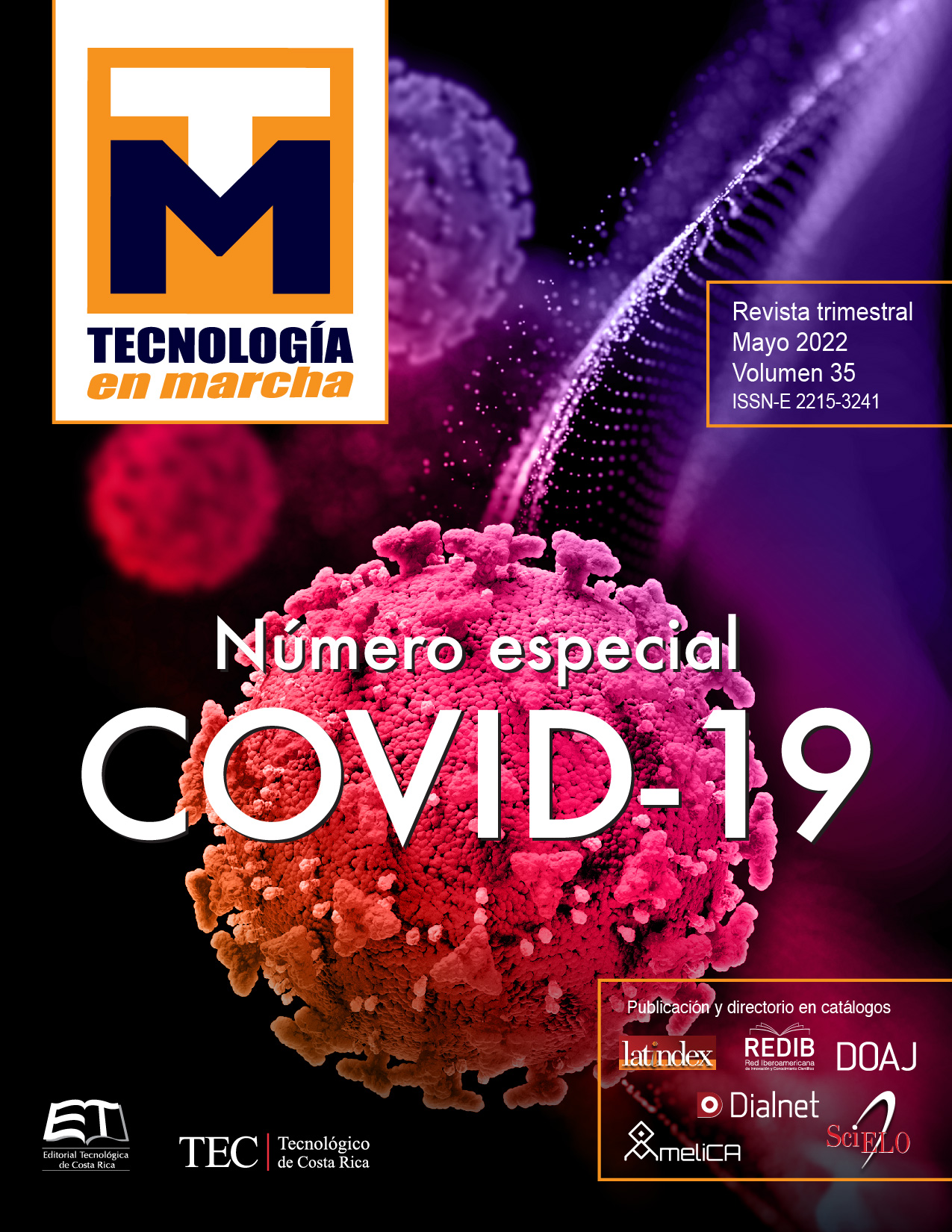Evaluating the implementation of remote emergency teaching during the COVID-19 context: a case study in chemistry laboratory subjects in a higher education institution
Main Article Content
Abstract
Emergency Remote Teaching (ERE) is an educational procedure that involves the use of distance learning solutions in scenarios in which the teaching process would otherwise be face-to-face or guided by hybrid resources; these techniques are meant to be an alternative during a crisis and are to be ceased once the emergency subsides. In this research paper, an Emergency Remote Teaching Strategy in Laboratories (EREL) was developed under the Extended Laboratory Model (LE), to be applied and evaluated in academical subjects that involve chemical experimentation laboratories at the Universidad Estatal a Distancia de Costa Rica (UNED-CR). The project assesses the effectiveness of the EREL from the perspective of the students, the teachers, and the development process of face-to-face experiments. According to the perception of the students, home experiments contributed to a greater extent (most effectively) in the understanding of the chemical concepts related to each subject. However, according to the perception of the teachers, the students must improve in aspects such as the safe handling of chemical substances and the correct usage of laboratory instruments, as well as the development of laboratory skills. EREL in the COVID-19 context is valued positively by the teaching staff and the students; nevertheless, it was also clear that a single face-to-face session is not enough for students to acquire the basic technical skills of laboratory subjects, which makes returning to traditional learning a priority, keeping the use of resources such as Remote Experimentation Manuals (MPR) as a complement in laboratory subjects.
Article Details

This work is licensed under a Creative Commons Attribution-NonCommercial-NoDerivatives 4.0 International License.
Los autores conservan los derechos de autor y ceden a la revista el derecho de la primera publicación y pueda editarlo, reproducirlo, distribuirlo, exhibirlo y comunicarlo en el país y en el extranjero mediante medios impresos y electrónicos. Asimismo, asumen el compromiso sobre cualquier litigio o reclamación relacionada con derechos de propiedad intelectual, exonerando de responsabilidad a la Editorial Tecnológica de Costa Rica. Además, se establece que los autores pueden realizar otros acuerdos contractuales independientes y adicionales para la distribución no exclusiva de la versión del artículo publicado en esta revista (p. ej., incluirlo en un repositorio institucional o publicarlo en un libro) siempre que indiquen claramente que el trabajo se publicó por primera vez en esta revista.
References
C. Hodges, S. Moore, B. Lockee, T. Trust y A. Bond (27 de marzo de 2020). The Difference Between Emergency Remote Teaching and Online Learning [En línea]. Disponible:https://er.educause.edu/articles/2020/3/the-difference-between-emergency-remote-teaching-and-online-learning
S. Sandi, “Experimentation Skills Away from the Chemistry Laboratory: Emergency Remote Teaching of Multimodal Laboratories”, Journal of Chemical Education, vol. 97, no 9, pp. 3011-3017, 2020. https://doi.org/10.1021/acs.jchemed.0c00803
A. Cazares, “La Actividad Experimental en la Enseñanza de las Ciencias Naturales. Un Estudio en la Escuela Normal del Estado de México.” Ra Ximhai, vol. 10, no 5, pp. 135-148, 2014. https://doi.org/10.35197/rx.10.03.e1.2014.09.ac
N. Chacón, F. Saborío y N. Nova, “El uso de recursos didácticos de la Química para estudiantes, en los colegios académicos diurnos de los circuitos 09 y 11, San José, Costa Rica”, Revista Electrónica Educare, vol. 20, no 3, pp. 1-24, 2016. https://doi.org/10.15359/ree.20-3.2
L. A. García-Argüelles, R. Escobar-Lorenzo y F. L. López-Medina, “Tareas experimentales de la química general para contribuir a la formación inicial del ingeniero mecánico”, Revista Cubana de Química, vol. 28, no 2, pp. 675-691, 2016.
M. Moya López, “De las TICs a las TACs : la importancia de crear contenidos educativos digitales”, DIM: Didáctica, Innovación y Multimedia, vol. 27, p. 1-15, 2013.
F. J. García-Peñalvo, A. Corell, V. Abella-García, y M. Grande, “La evaluación online en la educación superior en tiempos de la covid-19”, Education in the Knowledge Society, vol. 21, no 12, pp. 1-26, 2020. http://dx.doi.org/10.14201/eks.23086
Idoyaga, I. J (2020). El Laboratorio Extendido: una oportunidad para la educación científica en entornos digitales [En línea]. Disponible: https://er.educause.edu/articles/2020/3/the-difference-between-emergency-remote-teaching-and-online-learning
I. Idoyaga y J. Maeyoshimoto, “Las actividades experimentales simples: una alternativa para la enseñanza de la física”. En ENDFI, Arica, Chile, 2018, pp.55-68.
F. Torres (2018). Simulador virtual model ChemLab como estrategia para la enseñanza de la Química inorgánica [En línea]. Disponible: https://encuentros.virtualeduca.red/storage/ponencias/bahia2018/Y649mjsBHkVNjcZ8U7frEnhRllt2VWg2UmPajwM7.pdf
J. G. Dávila-Vélez, “El uso del video educativo como herramienta didáctica complementaria para el desarrollo de conocimientos procedimentales”, en Encuentro Internacional De Educación En Ingeniería ACOFI, Cartagena de Indias, Colombia, 2018, pp.2-9.
I. Idoyaga, L. Vergas-Badilla, C.N. Moya, E. Montero-Miranda, y A.L. Garro-Mora, “El Laboratorio Remoto: una alternativa para extender la actividad experimental”, Campo Universitario, vol. 1, no 2, pp. 4-26, 2020.
R. Hernández-Sampieri y C.P. Mendoza-Torres, Metodología de la Investigación: Las Rutas Cuantitativa, Cualitativa y Mixta. Ciudad de México: McGraw Hill Education, 2018.
E. Kelley, “Reflections on Three Different High School Chemistry Lab Formats during COVID-19 Remote Learning”, Journal of Chemical Education, vol. 97, no 9, pp. 2606-2616, 2020. https://dx.doi.org/10.1021/acs.jchemed.0c00814
A. Vergara, T. Chaves, A. Benitez y A. Ogando, “Implementing Project-Based Learning as an Effective Alternative Approach for Chemistry Practical Courses Online, Journal of Chemical Education, vol. 98, no 11, pp. 3502-3508, 2021. https://doi.org/10.1021/acs.jchemed.1c00379
N. Argel, P. Carasi, C. Manassero y A. Quiroga, “El Trabajo Experimental en Tiempos de Pandemia, Desafíos y Alternativas Virtuales”, en III Jornadas sobre las Prácticas Docentes en la Universidad Pública, 2020, pp. 1-7.

